Survey Overview
This opinion poll in Japan was conducted through a method of door to door visitation of men and women over the age of 18 (excluding high school students) from March 30th to April 15th. The total number of valid responses obtained was 1,000. The respondents' highest level of education was 45.1% high school graduate, 20.8% junior college/technical college graduate, 19.7% Bachelor's degree and 2.5% Master's degree.
The opinion poll in South Korea, on the other hand, was carried out through interviews by poll takers with men and women throughout Korea over the age of 19, conducted from March 25th to April 15th. The number of valid responses obtained was 1,004 and the respondents' highest level of education was 39.5% high school graduate, 11.6% college student/drop-out (including technical schools), 33.2% Bachelor's degree and 1.4% Master's degree.
The Genron NPO and East Asia Institute further conducted surveys separate from these opinion polls with intellectuals from both Japan and Korea between early to mid April. In Japan, questionnaires were sent to 2,000 intellectuals who had previously participated in discussions and surveys conducted by the Genron NPO, from which 575 responses were obtained.
The occupations of the intellectuals who responded included 20.7% company executives, 3.3% in media occupations, 3% national government officials, 2.1% local government officials, 0.9% politicians/party affiliates, 33.6% academics/researchers, 5.9% NPO/NGO members, 5.7% affiliates from each organization, 5.4% students, 3.1% self-employed, and 16.3% other. Intellectuals were likewise selected in South Korea, with 393 responses. Intellectuals' occupations in South Korea included 3.8% politicians, 36.1% professors, 18.3% researchers, 6.6% company executives, 11.5% public officials (including those working in public institutions), 7.6% journalists, 2.8% NGO staff, 6.9% professionals such as lawyers/accountants/doctors, and 6.4% other.
1. Impressions of One Another's Countries
First of all, the percentage of Japanese respondents who replied that they have a "favorable impression" of South Korea was found to be only 31.1, including those who replied they have a "relatively favorable impression" of South Korea. This number in South Korea was a mere 12.2%. In contrast, those who responded they have an "unfavorable impression" of South Korea, including "relatively unfavorable," was 37.3% in Japan. In South Korea, this number was 76.6%, showing that almost 80% of South Koreans have an unfavorable impression of the Japanese.
However, when these answers are compared to those of intellectuals, who have a significantly greater rate of experience abroad and/or direct interaction with those of the other country as compared to the general public, the number of intellectuals who replied with a "favorable" impression of the respective country was 53.4% for Japanese intellectuals and 59.5% for South Korean intellectuals (including the response, "relatively favorable"), showing a less pessimistic view as compared to the general public.
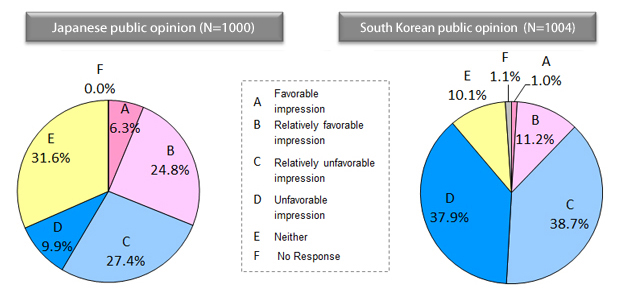
This survey also questioned how impressions of one another's countries have changed over the past year.
For both Japanese and South Koreans, the majority answered "no real change" at 52.9% and 49.7% respectively, but there were replies that impressions have "relatively worsened" or have "greatly worsened" from 39.6% of Japanese and 46.7% of South Koreans surveyed.
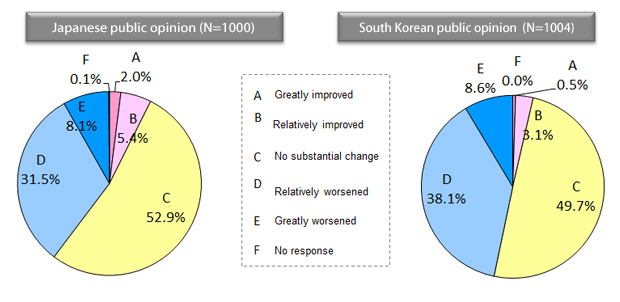
What is the cause for the negative impressions of both countries towards one another?
When those who hold negative opinions of the respective countries were asked about the reasons for this image, the majority of Japanese answered "criticism of Japan on historical issues" at 55.8%, followed by "continued opposition on the issue of Takeshima" at 50.1%, with these two issues exceeding half the population surveyed. However, the percentage of respondents who replied with a negative image of current Korean conduct for reasons such as "emotional behavior" (24.7%), "bringing political issues into sports" (22.8%) or "incomprehensible nationalism in conduct and ideas" (20.9%), simply added, amounted to over 60%.
Many of the intellectuals in Japan also see South Korean conduct as the cause of their negative image, with "emotional behavior" at 46.2%, amounting close to half of those surveyed.
In contrast, South Korean reasons included "the Dokdo issue" at 84.5% and "inadequate repentance over the history of invasion" at 77%, with the war over territories and issue of historical awareness marking a significant majority at about 80% each.
The structure of these responses can be seen similarly in South Korean intellectuals. The responses of these intellectuals further included "uneasiness about Japan's drift to the conservative right" at almost 30% of those surveyed.
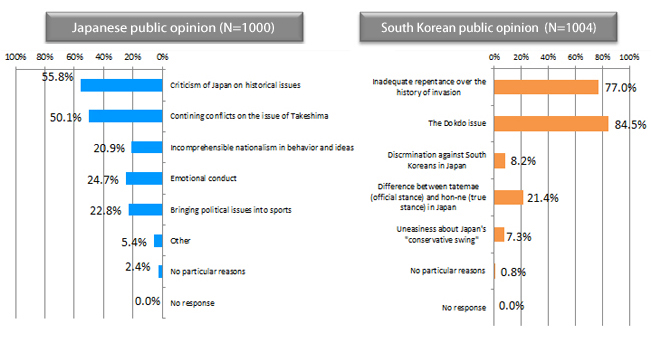
Alternately, those with positive impressions of the respective countries were also asked about their reason.
The greatest number of Japanese responses included "interest in South Korean culture, such as dramas and music" at 52.4%, or over half of those surveyed, followed by "South Koreans are serious and hardworking people" at 27.0% and because "South Korea is also a democratic nation" at 22.8%.
The majority of responses in South Korea, on the other hand, included "the Japanese are kind and serious people" at 59.8% followed by the reason that "Japan is a developed nation with high living standards" at 46.7%. Only 16.4% of respondents gave the reason that "Japan is also a democratic nation."
Most Japanese intellectuals at 40.4%, gave the response that "South Koreans are serious and hardworking people" and with South Korean intellectuals, the largest percentage of responses given was that "the Japanese are kind and serious people" at 69.7%.
2. Basic Understanding of One Another's Countries
In response to the question "what do you think of when you hear South Korea?," the majority of Japanese, at 59.1%, answered "Korean food." "Korean dramas and K-Pop" were also found in 47.2% of responses, showing a strong perception of Korean culture. However, due to opposition between the countries on the Takeshima-Dokdo issue, 56.7% of the public opinion pointed out the "Takeshima issue," while 32.0% pointed out "anti-Japanse sentiment and anti-Japanese demonstrations."
In response, South Korean responses overwhelmingly noted "the Dokdo issue" at 84.4% and "the issue of comfort women" at 61.5% . Territorial conflict and history constituted the two main issues forming the South Korean understanding of Japan, while under 10% noted factors such as Japanese food, high quality products, Mount Fuji, sakura (cherry blossoms), or manga/anime.
When the question of "known historical incidents in Japan/South Korea" was posed, the top response in Japan was "the rise of a female president" at 72.4%, followed by the "Seoul Olympics" at 71.1% and the "Japan vs. Korea World Cup" at 70%, with most Japanese mentioning relatively recent events that happened after the Japanese annexation of Korea.
Over half of South Korean public opinion, on the other hand, noted "Japan's invasion of South Korea (Jinshin waran / Bunroku-Keicho War)" (80.6%), the "dropping of the atomic bomb in Hiroshima/Nagasaki" (74.8%), the "Pacific War" (55.4%) and the "forced annexation of Korea" (49.9%), with incidents prior to and during World War II constituting the majority.
For "known Japanese/South Korean politicians," the majority of Japanese responses noted "Kim Dae-jung" at 75.7%, followed by the former president "Lee Myung-bak" at 65.5% and the current president "Park Geun-hye" at third with 51.9%.
For the South Koreans, the current prime minister "Shinzo Abe" constituted the overwhelming majority at 66.2%. He is followed by the former prime minister Junichiro Koizumi,who was criticized in Korea for his visit to Yasukuni Shrine, at 43.7%. However, apart from these two, those who mentioned other Japanese prime ministers constituted a mere 10% of those surveyed, with 22.3% replying they do not know any Japanese politicians.
Next the awareness of the social and political systems in one another's countries was also polled.
In regards to the "form of social/political systems in Korea," the majority of Japanese responded "ethnistic" at 43.3%, followed by "militaristic" (31.3%), "capitalistic" (31.2%) and "nationalistic" (29.4%). Only 28.3% of the Japanese polled considered South Korea to be "democratic." An overwhelming 70.3% of Japanese intellectuals considered South Korea to be "ethnistic."
In response, over half the South Korean responses (50.3%) regarded the present Japan to be "militaristic," constituting the majority opinion. Following this was "capitalistic" at 46.9% and "ethnistic" at 34.6%. "Pacifistic," a stance emphasized by post-war Japan, amounted to 8.8% and "internationalistic (based on the principle of international cooperation)" to 3.5%, not even reaching 10%. An understanding of the country as "democratic" also constituted only 24.1% of those polled.
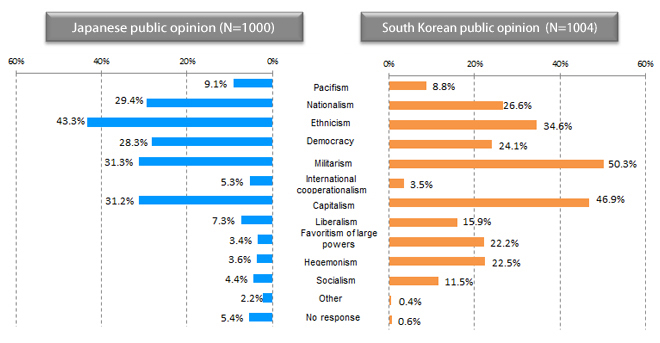
The national character of the two countries were judged here on the basis of 10 factors, whether the respective country is "kind/arrogant," "hardworking/lazy," "pacifist/belligerent," "flexible/stubborn," "trustworthy/untrustworthy," "honest/dishonest," "creative/imitative," "cooperative/uncooperative," "altruistic/egocentric" and "collectivist/individualist."
First, for the Japanese, "neither" constituted the majority of responses in 6 of these 10 factors, with many unable to give a clear judgement on the national character of the South Korean people. Of the responses, the greatest number of Japanese people, at 57.7%, noted an understanding that South Koreans are "hardworking" (including "relatively hardworking"). Apart from these, responses chosen by over 30% of the Japanese included "stubborn" at 47.6%, "egocentric" at 37.0%, "collectivist" at 34.4%, and "uncooperative" at 32.0%.
On the other hand, over three-quarters of the South Korean responses indicated Japanese national character as "hardworking" at 78.5% followed by "kind" at 69.2% and "egocentric" at 55.2%. Responses regarding the Japanese national character chosen by over 30% of the South Koreans polled included "creative" at 43.9%, "untrustworthy" at 39.5%, "honest" at 35.2%, "uncooperative" at 34.8% and "stubborn" at 33.9%.
3. Awareness of the Present and Future of Japan-Korea Relations
Bilateral relations between Japan and South Korea largely worsened due to the conflict over Takeshima/Dokdo at the end of 2012. This public opinion poll questioned the awareness of present Japan-Korea relations as well as its future.
The ratio of Japanese who view current bilateral relations with South Korea as "good" (adding both "extremely good" and "relatively good") was a mere 11.3%. Likewise for South Koreans, those who view the relationship as "good" was found to be an exceedingly low 3.4%, showing that an exceptionally low percentage of people view the current relationship between the two countries as "good."
On the contrary, those who expressed an understanding of this relationship as "extremely bad" or "relatively bad" amounted to over half the Japanese at 55.1% and 67.4% for South Koreans, with both countries showing a serious concern over their relationship.
This pessimistic understanding was similarly found with intellectuals from both countries, with 50.1% Japanese and 61.8% South Korean intellectuals expressing an understanding of the relationship as "extremely bad" or "relatively bad."
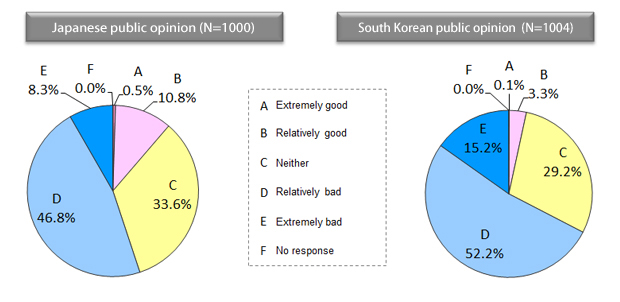
Next, in response to the question of "change in the two countries' relations over the past year," the proportion of Japanese who replied that relations "have gotten worse" (including both "have gotten exceedingly worse" and "have gotten relatively worse") amounted to 66.3%, while this number was likewise 53.9% for South Koreans.
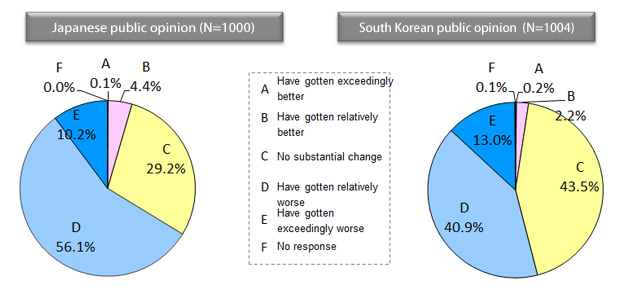
Lastly, the people's "views on future bilateral relations" were questioned. 34.6% of the Japanese and 59.5% of the South Koreans polled answered that future relations would "not change," constituting the majority of opinions in both countries. The proportion of Japanese who consider future bilateral relations to "get worse" (including "get relatively worse") amounted to 18.2%, while this number was 26.6% for South Koreans. Those who understood the relationship to "get better" (including "get relatively better") amounted to 23.1% for the Japanese and 14.0% for South Koreans.
In regards to intellectuals, however, 42.4% of Japanese intellectuals responded that relations would "get better" (including "get relatively better"). The ratio of South Korean intellectuals who responded that the relationship would "get better" also surpassed 30% (at 35.2%), exhibiting an optimistic view on bilateral relations different from public opinion.
What then do the two countries' people consider to be the barrier to development of bilateral relations?
An overwhelming majority of respondents from both countries chose the "Takeshima/Dokdo issue," at 83.7% of the Japanese and 94.6% of the South Koreans polled. For other reasons, however, opinions were split between the Japanese and South Koreans. The second largest factor for the Japanese was the "anti-Japanese sentiment of the South Korean people" at 55.1% followed by "historical awareness and education in South Korea" at 33.8% and "anti-Japanese coverage in the South Korean media" at 25.3%.
The second leading opinion in South Korea was "historical awareness and education in Japan" (61.1%) at over half the number polled, followed by "statements by Japanese politicians that incite anti-Korean sentiment" at 31.1% and "anti-Korean sentiment in the Japanese people" at 24.7%.
Intellectuals of both countries largely noted the "Takeshima/Dokdo issue" to be the barrier to bilateral relations. Most Japanese intellectuals responded "historical awareness and education in South Korea" and "anti-Japanese sentiment in the South Korean people," while South Korean intellectuals largely responded with "historical awareness and education in Japan" and "statements by Japanese politicians that incite anti-Korean sentiment."
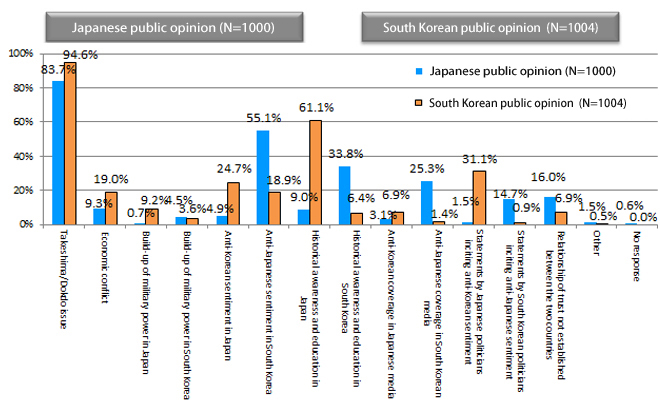
Over half the people of both countries hold the view that current bilateral relations are "bad." However, even while many take a pessimistic view of the two countries' relationship, over 70% of the people in both countries acknowledge the importance of Japan-Korea relations.
In Japan, those who consider Japan-Korea relations important make up 74.0% (adding both "important" and "relatively important"), while this number is 73.6% for South Korea. With over 70% of the respondents polled from both countries, this opinion constitutes the majority. In regards to intellectuals, this porportion was found at an overwhelming level of 81.2% for the Japanese and 90.3% for the South Korean intellectuals polled. Those who replied that the relationship is "unimportant," including the response "relatively unimportant," amounted only to 7.1% for the Japanese and 6% for the South Koreans.
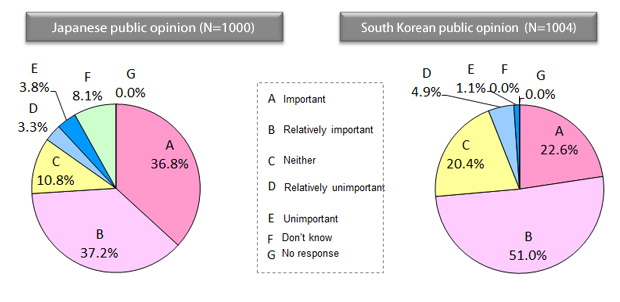
In addition to the importance felt by Japan and South Korea towards one another, this survey set out questions comparing the importance and familiarity of relations with China, a large power in East Asia with which both countries share a profound relationship.
Both countries were first polled on which relationship, Japan-Korea (Korea-Japan) and Japan-China (Korea-China), they felt to be more important in consideration of their countries' future.
Approximately half, or 49.6% of the Japanese and 55.0% of the Koreans polled, replied that "both are of the same importance," while the percentage who responded that "relations with China are more important" amounted to 20.0% of the Japanese and 35.8% of the South Koreans polled.
At the same time, while the response "Japan-Korea relations are more important" was given by 13.9% of the Japanese, the response "Korea-Japan relations are more important" numbered at a mere 9.3% of Koreans, with more Koreans viewing the relationship with China as more important.
The same structure could be seen in the responses of Japanese and South Korean intellectuals, with the proportion of South Korean intellectuals considering relations with China more important at 45.5% and Japanese intellectuals considering relations with China more important at 31.1%.
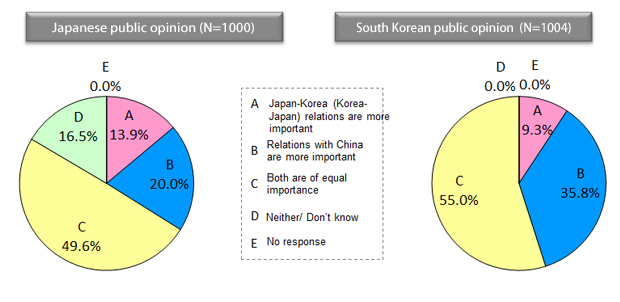
Questions were additionally posed comparing the affinity between Japan and South Korea, as well as the affinity towards China.
The difference in affinity felt by each country became vividly clear here as well.
For the Japanese, while nearly half responded that they feel "more affinity towards South Korea" (45.5%), only 5.9% responded that they feel "more affinity towards China."
For South Koreans, however, only 13.5% responded they feel "more affinity to Japan," while 36.2% replied they feel "more affinity to China." In addition to the fact that in South Korea, relations with China are considered more important than relations with Japan, the percentage of those who feel more affinity towards China was also three times the percentage of those who feel more affinity towards Japan.
The response that "no affinity is felt towards either" Japan or China, however, constituted the majority in South Korea at 38.0%. There is thus a need to keep in mind that close to 40% of the people in South Korea feel no affinity to either Japan or China.
This tendency differs slightly with Japanese and South Korean intellectuals. The largest number of responses from Japanese intellectuals indicated "more affinity towards South Korea" at 40.9%, largely surpassing the "more affinity felt towards China" response at 11.1%. For South Korean intellectuals as well, the response that they feel "more affinity towards Japan" measured 27.0%, surpassing the 18.6% of responses stating they feel "more affinity towards China."
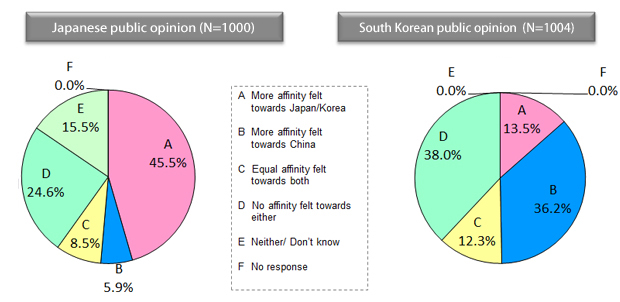
4. Leaders' Meetings and Private-Sector Interchanges
Between Japan and South Korea, interchanges on intergovernmental and private-sector levels have become active in recent years. In this part, the respondents were asked about their views regarding leaders' diplomatic activities ("shuttle diplomacy") undertaken by the Japanese and South Korean governments since 2004 to discuss challenges facing the two countries, and topics that must be taken up by their leaders, and about the importance of private-sector interchanges.
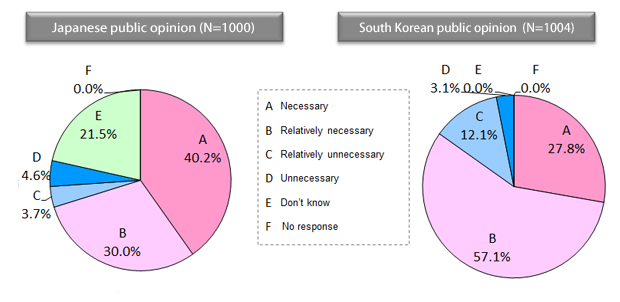
More than 70% of the respondents in both countries affirmatively replied about the necessity of the leaders' meetings ("shuttle diplomacy") between Japan and South Korea. Specifically, 70.2% of the Japanese replied such meetings are "necessary" or "relatively necessary" while 84.9% of their South Korean counterparts replied similarly. In response to a question about topics that must be taken up at the leaders' meetings, a bilateral dispute over the ownership of an island in the Sea of Japan was most frequently mentioned by those polled in both countries. The percentage was 43.9% for the Japanese polled and 76.8% for South Koreans. The island is called Takeshima in Japan and Dokdo in South Korea. Regarding increased tension over North Korea, the country's nuclear threat was mentioned by 37.1% of the Japanese and the fate of Japanese abducted by North Korea by 17.5% of them. These were the second and third most frequent answers on the Japanese side. On the South Korean side, 40.9% of the polled mentioned problems regarding the two countries' historical understanding, and South Korean women forced to serve as so-called "comfort women" for the defunct Japanese Imperial Army before and during World War II. This far surpassed the 31.3% for those who cited the North Korean nuclear issue.
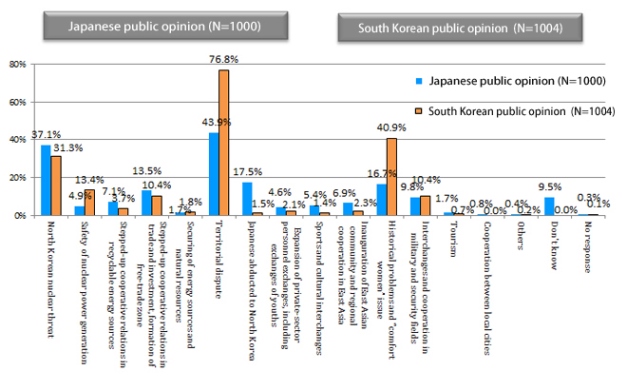
Of the Japanese polled, 47.7% replied they hope to visit South Korea. A comparable percentage on the South Korean side was 58%. This indicated that about half of the Japanese and South Koreans are interested in visiting each other's country. However, about 30% of the polled on both sides said they don't want to go. Specifically, 33.9% of the Japanese and 29.5% of the South Koreans replied so.
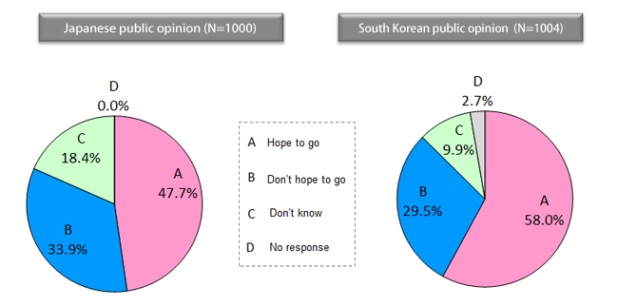
The Japanese who replied they don't want to visit South Korea were asked why. Then, 56.9% of them replied that South Korea is not as attractive a country as they would hope to visit. This was the most frequent answer. Meanwhile, 42.8 % of the Japanese referred to strong anti-Japanese feelings in South Korea. This was the second most frequent answer. On the South Korean side, 40.9% of those who replied they don't want to visit Japan mentioned their worries about nuclear contamination following the tsunami-triggered accident at Tokyo Electric Power Co.'s No. 1 Fukushima nuclear power plant in northeastern Japan in March 2011. Following this most frequent answer, 29.4% of the South Koreans replied they just hate Japan while 27.7% cited the existence of various challenges facing the two countries.
Among the Japanese polled, 74.7% replied that private-sector interchanges between the two countries are important or rather important. A comparable figure for the South Koreans was 75.2%. This indicated both countries' peoples are very aware of the importance of private-sector interchanges. When asked about areas where mutual interchanges must be promoted, the cultural field was most frequently mentioned on both sides - 34% on the Japanese side and 43.5% on the South Korean side. Besides, 22.7 % of the Japanese polled cited the mutual acceptance of students while 22.2% mentioned exchanges between media organizations. These were the second and third most frequent answers. On the South Korean side, 37.7% of the polled mentioned personnel exchanges between private enterprises. This was followed by 35.8% for exchanges between media organizations, and 27.8% for exchanges between academic and research organizations.
5. Awareness about Historical Issues between Japan and South Korea
In this part, the respondents were asked about their awareness of the historical issues between the two countries, which are one of the biggest outstanding challenges in bilateral relations along with the territorial dispute over the island in the Sea of Japan.
- Solution to Historical Issues and Japan-South Korea Relations
Of the Japanese polled, 32.1% replied that it will be difficult to solve the problems regarding the two countries' historical understanding even if their relations develop. This was the most frequent answer. However, 25.9% replied that bilateral relations will not develop unless the problems regarding their historical understanding are resolved while 23.6% replied that as the two countries' relations develop, the problems regarding their historical understanding will be resolved gradually. As a result, about 90% of the Japanese polled were almost equally divided into these three opinions. On the South Korean side, 41.5% of the polled replied that bilateral relations will not develop unless the problems regarding their historical understanding are resolved, indicating South Korea's insistent position that the historical issues must be solved for promoting bilateral relations. The answer that the problems regarding their historical understanding will be resolved gradually as the two countries' relations develop was cited by almost 30%t of the South Koreans polled.
- Challenges in Historical Aspect between Japan and South Korea
As far as challenges to be resolved in the historical aspect between Japan and South Korea are concerned, many Japanese mentioned excessive anti-Japanese activities in South Korea against the background of its understanding of historical issues between the two countries, as well as its anti-Japanese education and its sharp reaction to the adoption of Japanese school textbooks with lenient expressions about Japan's wartime acts in recent years. On the South Korean side, many of the polled mentioned the Japanese people's understanding of the historical problems between the two countries, and what they see as lack of full apologies by Japan for its colonial rule of Korea and its wartime acts.
Of the Japanese polled, 55.2% cited excessive anti-Japanese activities in South Korea as a problem that must be resolved. This was followed by 54.8% for those who mentioned the anti-Japanese education in South Korea.
On the South Korean side, the largest percentage of 72.4% of the polled mentioned the problems regarding Japanese school history textbooks. This was followed by 51.1% for those who cited Japanese people's understanding of Japan's wartime acts and 42% for those who mentioned their understanding of the problems regarding the so-called ''comfort women.'' Further, 35.4% of the polled cited Japan's lack of remorse and apology for its past history. Only 3.6% of the polled on the South Korean side mentioned excessive anti-Japanese activities by South Koreans against the background of their understanding of historical issues between the two countries. On the Japanese side, not a few people believed that the historical understanding on the part of Japan must be resolved. Specifically, 26.8% of the Japanese cited Japan's understanding of its invasion of Asian countries as a problem that must be resolved while 24.1% mentioned Japan's understanding of the fate of South Korean women forced to provide sexual services to Japanese soldiers during the wartime years.
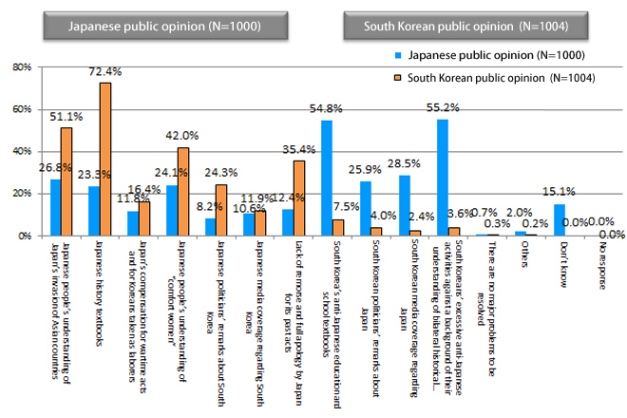
Japanese parliament members' recent visits to Yasukuni Shrine, a war-related Shinto shrine in Tokyo, drew sharp reactions from the South Korean government, as instanced by the cancellation of a planned foreign ministers' meeting between the two countries. Those who visited the shrine this time included former Prime Minister Taro Aso, who currently serves as deputy to Prime Minister Shinzo Abe. The Yasukuni problem, particularly Japanese politicians' controversial visits to the shrine, remains a major negative factor in bilateral relations. In this part of the survey, the polled in both countries were asked about the advisability of the Japanese prime minister's visit to the shrine. The poll showed a sharp division between the Japanese and South Koreans about the Yasukuni issue. On the Japanese side, almost half of the polled replied that there will be no problem even if the Japanese prime minister visits the shrine. Meanwhile, over a quarter of them replied that there will be no problem if the visit is made as a private citizen. Overall, more than 70% of the Japanese sounded tolerant toward the Japanese prime minister's visit to the shrine. Conversely, 60% of South Koreans replied that the visit to the shrine should not be made, whether it is in an official capacity or as a private citizen. Less than 40% of the South Koreans replied that there will be no problem with the Japanese prime minister's visit to the shrine or that there will be no problem if it is made as a private citizen. These two answers were given by 5.2% and 34.4%, respectively.
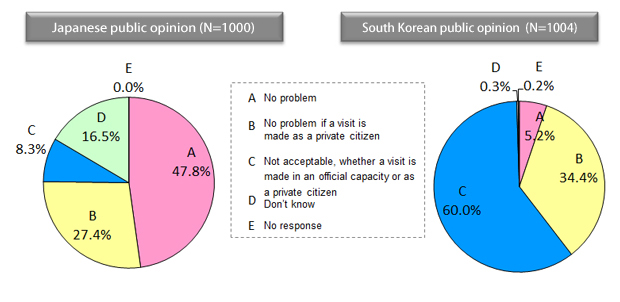
6. Both Peoples' Understanding of the Future of the World, Asia,
Japan and South Korea
The questions in this part of the survey dealt with the polled people's understanding of the future of the world and Asia, as well as the future and influence of each other's country.
Asked about which country or area will lead world politics from now on, over 5051.3% of the Japanese and almost 7574.8% of the South Koreans chose the United States. Of the Japanese polled, 24.7% mentioned the Group of Eight (G-8) major countries while 19.3% cited the Group of 20 (G-20) countries. China was mentioned by only 18.7 percent of the Japanese polled.
Of the South Koreans polled, 71.7% cited China as a country that will lead the world in the years to come.
This almost matched the 74.8% who cited the United States, indicating the South Korean people expect that world politics will be dominated by the United States and China, the Group of Two (G-2), from now on.
Only a few people in both countries cited each other's country as a leader in the world political scene in the future. Specifically, 1.2% of the Japanese selected South Korea while the percentage of South Koreans who cited Japan was only 4.7%.
Those who see their country as a future world leader were also limited - 9.9% of the polled in Japan and 5.5% in South Korea.
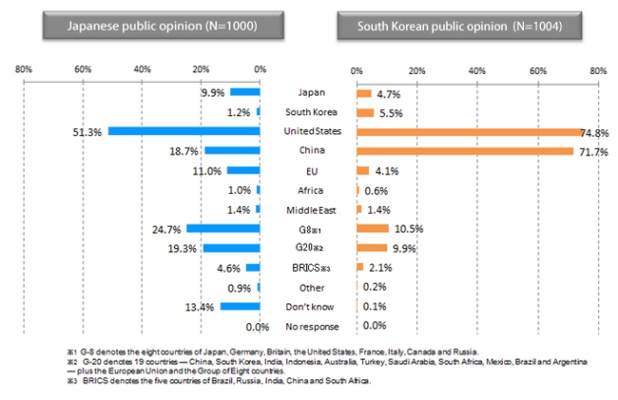
When asked about the influence South Korea will have in the year 2030, 32.8% of the Japanese polled replied "I don't know exactly about it." This was the most frequent answer, indicating that one-third of the Japanese have no idea about South Korea's influence in the future.
The poll showed relatively many Japanese expect South Korea will become a "middle power" in the world. Specifically, 21.3% of the Japanese polled mentioned South Korea as a medium but very influential country while 14.9% described South Korea as a small but highly influential country.
Among Japanese intellectuals polled, the largest group of 34.8% replied that South Korea will be a medium but very influential country in 2030. Of the South Koreans polled, the largest percentage of 34.1% replied that Japan will remain the world's No. 3 economic power in the year 2030.
This was followed by 29.6% for those who replied Japan will be a medium but very influential country. South Korean intellectuals were divided on Japan's influence in the years ahead. Of these polleesrespondents, 36.4% replied that Japan will be a medium but very influential country in 2030. Conversely, 30.5 percent of them replied that Japan will be a medium country but will have no influence. Meanwhile, 21.6% replied that Japan will remain the world's No. 3 economic power.
Asked about mutual influence to be created by each other's economic development, nearly half of the Japanese polled believed the economies of the two countries have a "win-win" relationship. Specifically, 45.0% of the Japanese replied that South Korea's economic development will be favorable and necessary, or relatively necessary, for Japan.
Conversely, almost half of the South Koreans polled replied that Japan's economic development will be a threat, or more or less so, to South Korea. Those who have a favorable view about Japan's economic development stood at only 31.6 percent. 6-4. Will Asia Be a Single Economic Zone?
Asked whether Asia will be integrated into a single economic zone, just like the European Union, in the future, 52.8% of the Japanese and 41.7% of South Koreans took a negative view of such a possibility. However, 21.4% of the South Koreans polled replied they expect Asia will be a single economic zone in the future, far surpassing a comparable figure of 4.8% on the Japanese side. This indicated that South Koreans have a more positive attitude toward possible economic integration in Asia. 6-5. Korean Peninsula Situation 10 Years On
Those polled in both countries were asked about the Korean Peninsula situation in 10 years. Of the Japanese, 47.1% replied that the future situation in the region is unpredictable. About 40% of the polled sounded pessimistic about the future of the Korean Peninsula. Specifically, 20.7% replied the situation there will remain as it is while 20.4% replied the confrontation with North Korea will intensify. An optimistic view that moves will start toward a reunification of the two Koreas was aired only by 11% of the Japanese polled. The South Koreans who replied the Korean Peninsula situation is unpredictable accounted for almost 40%.
The optimistic view that moves will start toward a reunification of the two Koreas was supported by 22.9%. This surpassed the 21.7% foreseeing no change in the situation there and the 15.4% expecting a more serious confrontation with North Korea.
Among intellectuals in both countries, the optimistic scenario that moves will start toward a reunification of the two Koreas was most frequently selected, by 52.9% on the South Korean side and 31.3% on the Japanese side.
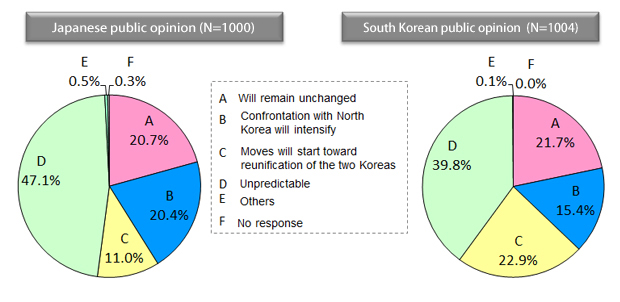
7. Territorial Dispute, Military and Security Situation in East Asia
The questions in this part concerned the territorial dispute over the Sea of Japan island, called Takeshima or Dokdo, which remains as an obstacle to efforts to develop bilateral relations and a factor that badly affects the two peoples' feelings toward each other's country, and the military and security situation in East Asia, where tension is increasing over North Korea's nuclear and missile development programs, and China's continued military buildup in recent years.
-- Is there a territorial dispute between Japan and South Korea? The confrontation between Japan and South Korea intensified over the ownership of the island from late last year. But the polled in both countries had similar perceptions about whether a territorial dispute exists between the two countries. Specifically, the alternative that there is a territorial dispute between the two countries was selected by 69.2% of the Japanese and 82.7% of South Koreans.
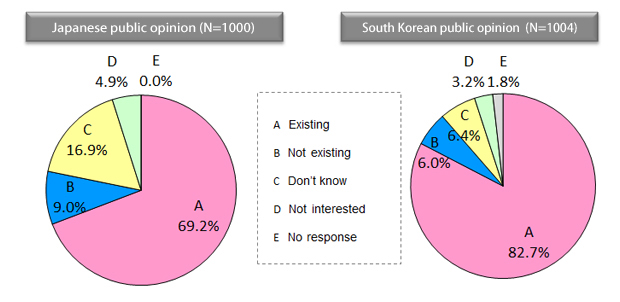
Those who replied there is a territorial dispute between the two countries were asked how it should be resolved.
The poll showed public opinion about this differed sharply between the two sides.
An overwhelming 60.7% of the Japanese polled replied that the dispute should be brought to the International Court of Justice to find a solution under international law. Among the South Koreans polled, the largest percentage of 37.7% replied that South Korea should strengthen its effective control of the island to protect the territory. Meanwhile, 20.4% of them replied that South Korea should not hesitate to use force over the dispute.
However, not a few South Koreas sought a peaceful solution to the dispute. Specifically, 26.7% of them replied that the two countries should pursue a peaceful solution while trying not to intensify their confrontation over the territory. Meanwhile, 15.1% replied that South Korea should agree to Japan's attempt to bring the dispute before the International Court of Justice.
Among South Korean intellectuals, 57.6% called for strengthening the effective control of the island as a solution to the dispute.
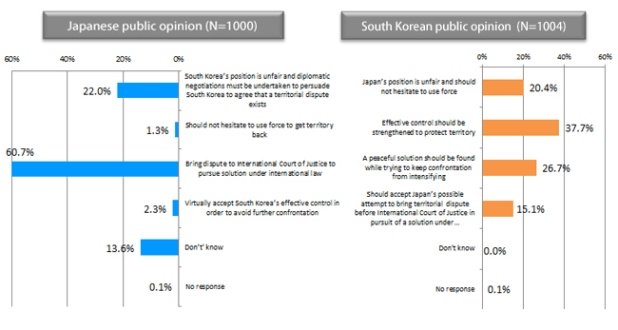
The polled in both countries saw North Korea as the largest military threat. North Korea was cited as a military threat by almost 8078.9% of the Japanese and 86.7% of South Koreans. Of the Japanese polled, China was mentioned by 60.1%, the second most frequently cited alternative. China was also cited as a military threat by 47.8% of the South Koreans polled. But a nearly matching percentage of 43.9% cited Japan as a threat to them. Meanwhile, only 12.2% of the Japanese mentioned South Korea as a threat.
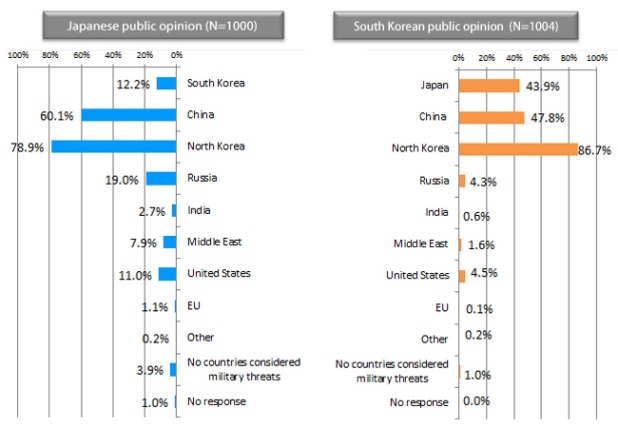
Japan and China, as two major countries in East Asia, have been at odds over the ownership of the Senkaku Islands in the East China Sea in recent years. Those polled in both countries were asked whether a Japan-China military dispute will occur in the waters of East Asia. Of the Japanese polled, 26.9% replied they expect such a military dispute will occur within a few years or in the future. A comparable figure on the South Korean side was far higher at 66.5%. Of the Japanese polled, 41.4% replied that they don't expect a military dispute to occur between Japan and China, surpassing the 26.9% foreseeing the occurrence of such a dispute. This indicted that many Japanese are rather calm toward the possibility of a military dispute occurring between Japan and China.
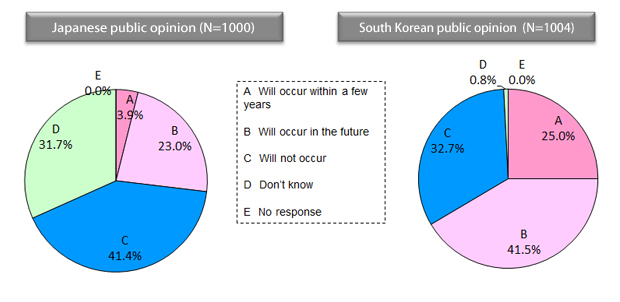
8. Views about Media Coverage, Public Opinion on Internet in Own Country
The peoples of both countries rather depend on their country's media reports to form views and obtain information about each other's country. This tendency was attested in a question earlier mentioned. The pollees respondents were here asked about their views on their country's media coverage and public opinion on the Internet.
Finally, the respondents were asked about their views on the press and opinion activities, and media organizations in both countries.
Of the Japanese polled, nearly half49.1 percent replied that they think South Korea lacks or effectively controls freedom of the press and speech. A similar tendency was seen among the South Koreans polled; 51.7 % of them observed a lack of or effective control of freedom of the press and speech in Japan.
However, 45.9% of the South Koreans polled replied that Japan has no information control, with freedom of the press and speech guaranteed.
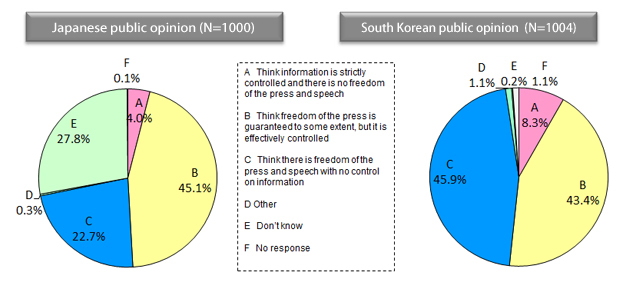
When asked whether the media coverage in their country about Japan-South Korea relations is objective and impartial, only about 30% of the Japanese and South Koreans polled replied that they think so. The percentage of Japanese who so replied came to only 31.3 % while this view was shared by 33.0 % of their South Korean counterparts. The alternative "I don't think so" was selected by 26.2% of the Japanese and 41.6 % of South Koreans. The percentage of intellectuals in both countries who replied "I don't think so" was higher than that of ordinary respondents in the respective countries. Specifically, 51.7% of Japanese intellectuals replied in the negative to the question while 56.5% of their South Korean counterparts replied so.
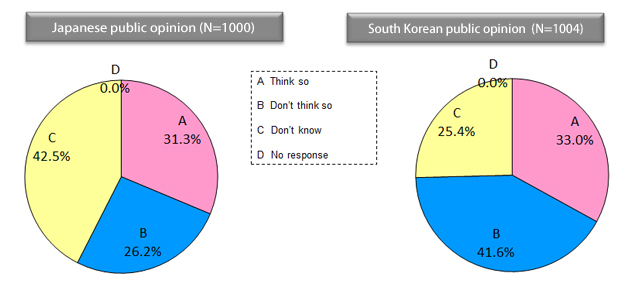
Finally, those polled were asked about whether opinions on the Internet appropriately reflect people's views in the two countries, at a time when opportunities are increasing for the Japanese and South Korean peoples to use the Internet as a tool to better learn about each other's country, and when the Internet has a great influence on the formation of public opinion in the two countries.
The poll showed that South Koreans are more satisfied that their opinions are appropriately reflected on the Internet.
Of the Japanese polled, 41.7% replied that they don't think the Internet reflects public opinion. This far surpassed the 11.2% who see public opinion appropriately reflected on the Internet. But 46.9% of the Japanese replied, "I can't say yes or no" or "I don't know." On the South Korean side, 39.5% of the polled replied the Internet appropriately reflects public opinion. This compared to 45.4% for those who replied negatively to the question.
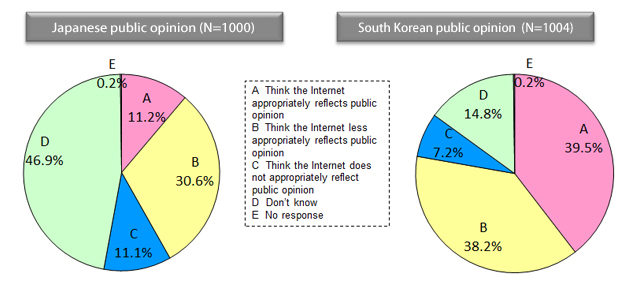
Post a comment